#heroic villanous
Text
Maybe I had the fantastic idea of making a Steven Universe Villanos AU centered on the Blackgax ship.
Anyway, I present to you the diamond court of this AU.

#villanous cartoon network#heroic villanous#villanous#villanos#black hat#lord black hat#white hat#him powerpuff girls#aku samurai jack#mr ?#blackgax#steven universe#steven universe au
16 notes
·
View notes
Text
Today 2024 redraw:

The 2022 redraw:

And last,the original draw from 2019:

Its a clem and dem.
#fanart#mydrawing#my drawing#myart#villanous fanart#villainous#dementia#demencia#clementia#clemencia#heroic au#traditionaldrawing#traditional draw#traditional art#artists on tumblr#redraws#draw this again
8 notes
·
View notes
Text

Im actually really normal about him
Oh and yeah his hair is like that even when he’s back to his normal form (although he hides it under his hat :3)
#art#artwork#character art#my oc art#au art#oc art#oc tag#villainous au#villainous art#villainos#villainous black hat#villainous bh#lord black hat#white hat#heroic au#paperhat child#villanous#villainous oc#traditional doodle#traditional art#traditional drawing#the voices the vo- /j
10 notes
·
View notes
Text
I thought about making a roleplay Discord for Villainous again…. I really want to keep myself invested and glued into it haha. Plus I truly do want to get better with musing Black Hat, this would be an eighteen plus server and I do allow AU’s into the mixture…since Villainous does technically crossover with other dimensions. The main focus will be on villainous however.
#black hat#villainous black hat#black hat organization#villanos#villianous#lord black hat#doctor flug#dr kenning flugslys#villainous dr flug#dr flug#villainous 505#505#demencia#villainous demencia#villainous rp#villanous#cartoon roleplay#heroic au#white hat organization#white hat#dr slug#clemencia
13 notes
·
View notes
Note
I just recently rewatched NWH and I couldn't help but think Raimi Venom would have fit better than Sandman. Flint made his peace with Peter and didn't die fighting him. Eddie on the other hand...
Hm. Nah, I don’t think so. Building a plot point off the imaginary good in Norman Osborn of all people was bad enough but I think I’d actually riot if they took this guy
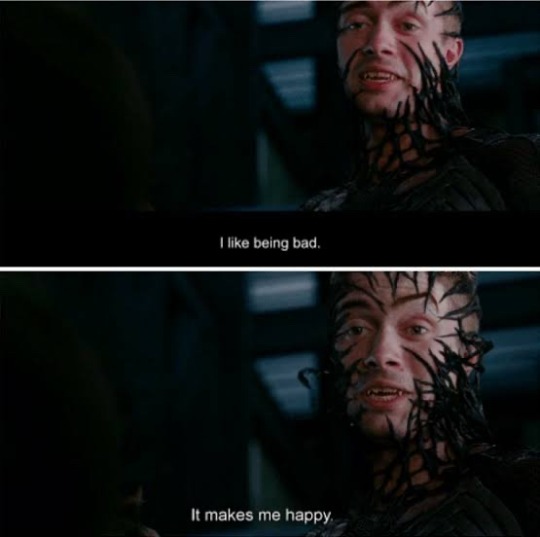
And gaslit me into believing he had a shred of decency in him to begin with
#Like. That’d be completely antithetical to the point in SM3#Peter Parker while capable of being an ass is still a good person. Eddie Brock is not. Eddie embraces revenge whereas Peter grew ashamed#Peter is humbled Eddie is humiliated. That’s the difference y’know?#And you can apply that to Norman too—while Peter becomes more of his true self and by extension more heroic Norman becomes more villanous#Ugh the whole box plot point is just so fucking stupid so no I would prefer if they didn’t mess up Topher Eddie too#ask#anti mcu spiderman#eddie brock#venom#topher grace
33 notes
·
View notes
Text

My little Clemencia
#made in ibis paint#my art <3#digital art#my art sketch#fanart#villanous#alan ituriel#heroic au#cartoonetwork
9 notes
·
View notes
Text
White Hat and Dr. Slug
I heard this ship gets called silkbag? Anyway, This was the warm up sketch yesterday. I had some stuff to make and I realized I have been forgetting to post here. Oops.

#Villanos#Villanous#vilanesco#VillanosAU#VillainousAU#Heroic#White Hat#Dr. Slug#Heroic White Hat#Heroic Dr Slug#Silkbag#sketch#warm up sketch#trying to learn to sketch out and let it not be perfect
7 notes
·
View notes
Text
Not to bring up 2016 MHA but I really dislike that the one portion of UA training that was supposed to focus of rescue not combat gets overshadowed by combat
#like theres something to be said for each group rescuing one another#but it sucks that we dont see that portion of Heroics#and how the circumstance to need to rescue people would often be caused by villans#or maybe something about how violence is pervasive even throughout safe spaces within the social structure they've build#mha#sigh#mha s1 e9#ia rambling
0 notes
Text
I've been thinking a lot about Kai and Morro again, and specifically their parallels (dangerous thing, I know) and I just really wanted to ramble about what I've taken to calling the inferno of destiny parallel.

As a beginner ninja, both Morro and Kai dealt with arrogance, recklessness, and anger. We see this in how Morro took extremely dangerous risks to get Wu to save him, with how he assumed he was to be the green ninja when Wu told him he believed Morro was to wear green, and how Morro reacted when the weapons didn't react to him (ripping off the sliding door). We see this in how younger Kai jumps into situations without a genuine plan, how he gets angry and often (literally) explodes with fire when something frustrates him, and how he kind of defaults to the coolest person on the team/the hot one/the center of attention/etc when that's just really the immature persona he's thrown up to try and be the best.
Both Morro and Kai want to be the best at what they can do, and when they heard about a chance to be even better than their original concepts of the best (becoming the Green Ninja), both of them jumped at it.
Morro trained so hard he ended up hurting the kids he was training against and worrying Wu
Kai tried so hard to be the green ninja he ended up placing unnecessary strain on his relationships and even went so far as to risk letting people get hurt/die because he was prioritizing what he thought might get him closer to being the Green Ninja (a competitive line of thinking that Kai's been known to buy into in addition to his constant needs to try to be the best in the situation before he matures) (btw I'm talking about him originally trying to get the fang blade instead of. yknow. the CHILD about to burn lol.)
So, where do we see the shift from heroic to villanous in these two suspiciously similar characters? Well, it's when both of them are placed in an inferno scenario where they have to choose between pursuing their perceived destiny and their true destiny; hence, the inferno of destiny parallel.

Morro
When Morro searches so long to try and find a way to become the Legendary Green Ninja and rewrite destiny, he eventually finds himself in the Caves of Despair. We don't have the details of what happened, but we see the ninja try to escape Morro's fate in season 5 episode 7 titled "The Crooked Path". Here we see them encounter geysers that are releasing poisonous gases at an alarming rate, and they also spray boiling water/steam out in addition to rising the temperature to an unbearable level in the cave. It's reasonable to assume that Morro experienced a cave-in due to the caves' lack of structural integrity (also experienced by the ninja)* and then was killed either from burns from the hot steam and/or due to inhaling too much of the dangerous gasses.
The point of Morro's inferno: Morro couldn't accept the fact that he was not destined to be the Green Ninja, so he wasn't willing to turn away from his perceived destiny to save his own life. He wouldn't leave the cave because he couldn't let go of the fact that his perceived destiny wasn't his true destiny.
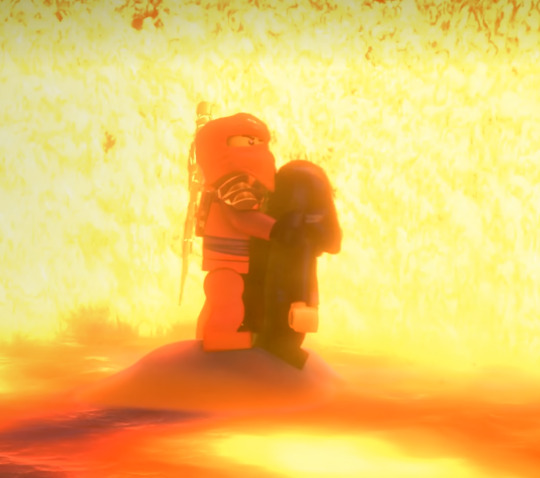
Kai
When Kai trains and practices to become the Green Ninja, making rash decisions (like jumping down for the Fang Blade again) and reckless choices that hurt his relationships (like barricading himself into a room to fight Garmadon for… literally no reason other than his desire to be the Green Ninja), he eventually finds himself in a similar inferno: The Fire Temple. An ancient temple constructed inside a volcano that once held the Sword of Fire, this is where the fourth and final Fang Blade is located and where the ninja must fight against Pythor and the other Serpentine generals for it. The volcano begins to erupt and collapse in on itself, and Kai ends up with a choice: save young Lloyd from his inevitable death in the erupting volcano, or try to reach the Fang Blade before it ends up in the hands of Pythor. This is the critical moment* for Kai, as he has to choose between his percieved destiny (becoming the Green Ninja and getting the Fang Blade) or his true destiny (protecting Lloyd in the hopes of saving both of their lives). In the end, he chooses to give up the thing he'd been working towards for most likely months now to try and be the best in the favor of saving a kid that used to be a massive pain in the ass (no offense, little Lloyd).
The point of Kai's inferno: Kai gave up his perceived destiny in the end, and only then was he able to unlock his True Potential in addition to being able to escape the Fire Temple safely with Lloyd and himself still alive. He was able to save himself and Lloyd because he gave up something that had felt like such a core part of his being, that he believed was his destiny, even though it turned out not to be.
He even says this himself to Sensei Wu: "I knew when I had to make a choice. I wanted the Fangblade so badly, to prove I was good enough to become the Green Ninja. But then I figured it out. All of my training to become the best ninja wasn't in preparation to become the Green Ninja. It was… to protect him." (s1e10, titled "The Green Ninja")
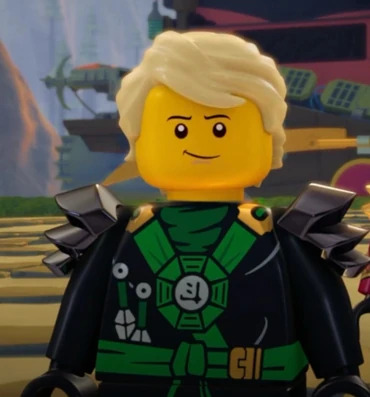
Kai and Morro both experience infernos that threaten their lives and rely on their ability to relinquish their percieved goals in favor of the objectively best choice in the moment. Morro was unable to give up what he truly believed was his destiny, and he ended up dead and sent to the Cursed Realm as a result. Kai was able to give up what he had been working towards for so long, and was able to save his life and Lloyd's life (especially entertaining when you remember that Kai had to give up trying to be the Green Ninja to… save the Green Ninja, lmao)
The critical moment I noted with a * for both Kai and Morro is that this point is the moment where each of them have to decide what's more important to them: what they believe is their destiny, or what would save their life. Morro tried to push through to his "destiny" and became too hurt or sick from the fumes to escape, and eventually died there. Kai gave up his "destiny" and just barely managed to escape with his life and Lloyd's.
So yes, I love the inferno of destiny parallel quite a bit! All three of these characters are very near and dear to my heart and they're rotating in my brain like a rotisserie chicken lmao
#back on my morro bullshit again#guess who's probably gonna rewatch possession soon ayyy#ninjago morro#kai jiang#kai smith#kai ninjago#ninjago kai#ninjago#morro ninjago#ninjago possession#didn't realize how long this was gonna be until I finished it and was like “ o h ”#anyways now the void of tumblr gets to deal with my ramblings#krow rambles
168 notes
·
View notes
Text
It's the fact that Shinsou was able to be the centrepiece of a heroic mission despite everyone in his life telling him that his quirk is villanous.
It’s the fact that everyone in class 1-A was so excited to see Shinsou again.
It's how Ojirou, the person in 1-A who probably disliked Shinsou the most, was so excited about him joining the hero course that his tail started wagging.
It's how Kouda, who had trouble speaking at all in the earlier seasons, welcomed Shinsou into the hero course despite being visibly nervous.
Class 1-A are genuinely some of the most friendly, accepting, and open-minded fictional teenagers and it's the sweetest thing ever.
#hitoshi shinsou#mashirao ojiro#koji koda#I love this clip so much ok#my hero academia#boku no hero academia#mha#bnha
215 notes
·
View notes
Note
You need to make another one of those "metas written by comparing characters with another show you liked" post about Getou now that you experienced FGO Morgan/Aesc.
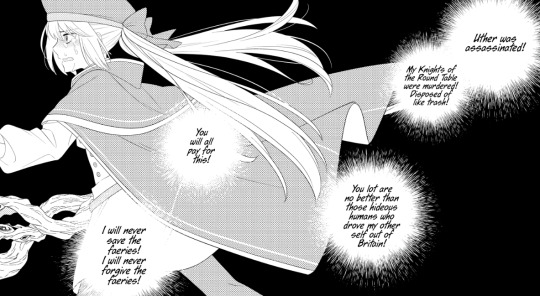

Time to compare two characters from two different shows I liked (in this case Jujutsu Kaisen and Fate Grand Order: Cosmos of the Lostbelt 6 Faerie Britian) to illustrate what makes a good corruption / fallen hero arc. Two of the best examples I can think of in recent memory are Geto Suguru, and Morgan le Fay of Faerie Britian. They both have tragic arcs which follow similar beats which I think will illustrate exactly why audiences find these characters so compelling.
Both of these characters have their stories told out of order, appearing as villains first before their backstory is revealed but for the sake of simplicity I'm going in chronological order, the heroes they started as all the way to the villains they ended up being.
Before beginning though, a brief lesson on tragedy. Aristotle's poetics argued tragedy runs on the principal of catharsis. The audience feels for the characters on stage, no matter how terrible their acts may be. He argued in favor of moral ambiguity in its heroes. The tragic hero must neither be a villan or virtuous man, but a "character between these two extremes, ... a man who is not eminently goo and just, yet whose misfortune is brought about not by vice of depravity, but by some error or frailty [Aristotle's Poetics.]
The protagonists of tragedies are still heroes, but their good qualities are twisted against them. A tumblr post I see going around from time to time makes the argument that if Othello (the protagonist of Othello) were in Hamlet the story would not be a tragedy because Otello would just stab his uncle and avenge his father. If Hamlet (the protagonist of Hamlet) were in Othello, the story would not be a tragedy because Hamlet who is a characteristic overthinker would probably not fall victim to Iago's manipulations and jump to conclusions the way Othello did. Both of these characters are heroic, Hamlet is a clever and scheming prince, Othello is a talented general a moor who's managed to rise up the ranks in a racist society. However, they are both put into stories where those heroic values are twisted against them by the narrative framework itself. So to make the protagonists of tragedies into villains who were evil all along, ruins the moral ambiguity and therefore the catharsis of a tragedy.
Geto Suguru and Morgan Le Fay are heroes, placed in a narrative framework that twists their own heroic traits against them in ways they can't endure. They fall because of frailty, not because they were inherently evil to begin with. They are antagonists who have the qualities of protagonists, and once were arguably protagonists of the story, which is probably why they have so many fans in the audience despite the fact that they are both of them mass murderers and tyrants.
Now with the long preamble let's look at the stories.
Both characters start as essentially protagonists, and they foil the protagonists they are fighting against during their villain phase. Geto Suguru is a heavy foil for Yuji (we'll talk about this later) and Morgan so heavily foils Castoria because they are both the chosen one.
I'm going to start with Morgan because Fate/Nasuverse lore is a pain to explain. To simplify her story, Morgan Le Fay is from an alternate universe version of Britian. In that Britian everything is ruled by faeries. These are trickster faeries who are total jerks and extremely murderous at times. They were supposed to forge excalibur, but they just didn't do it because they were lazy. This was very bad, so the universe sent a big huge guy to tell them to forge the sword. They were lazy though so instead of listening to him they murdered him in his sleep and he died a horrible death.
The faeries could no longer be forgiven for failing to craft excalibur which is a really important sword that needed to exist, so god or heaven or fate or whoever decided to punish them and sent Aesc who will later be known as Morgan le Fay.
There's some time travel shenanigans but I'm going to skip it because it's confusing. Basically Aesc's job is to wipe out all fairy life and bring an end to their alternate universe, but she decides to defy her destiny instead. The heavens or whoever keep conjuring calamities to wipe out the fairites to punish them for their sins, but instead Aesc fights against them and saves the fairies.
I had a duty to paradise, but I knew that duty would result in Britiain's destruction. This other me, though... She loved Britiain dearly, even the lostbelt version of it. I thought about it, and I realized I wanted the same thing she did. From then on I chose to live as her.
(Witch! Witch! Witch! You were the only one to survive the calamity)
Countless times, I stopped the calamities. Countless times, I mended clan disputes to end wars.
I did not mind.
It was not the fairies I loved. I only loved britain itself and the home I would make here.
It would be my very own Britian - something that was forever beyond my reach in Proper Human History.
I did everything I could to make it a reality.
Eventually though, I realized the best way to do that was to keep the faeries safe.
However, because Aesc is not one of them the fairies are generally ungrateful for her saving them again and again. Aesc gathers comrades around her to help ward off these calamities and save people, but she's often attacked by the same fairies she's just saved.
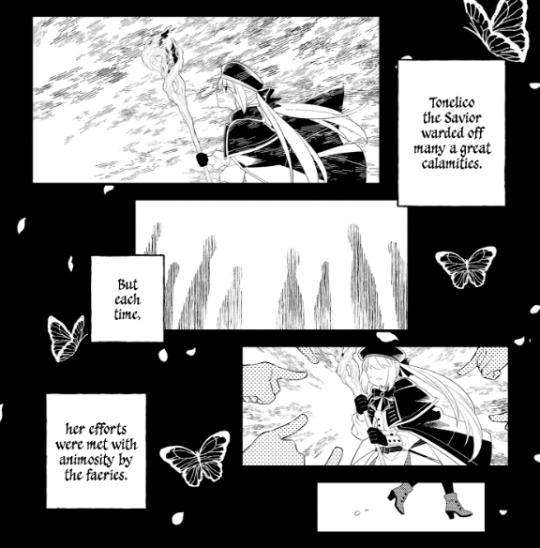
She continues fighting the system of her world again and again, until she's betrayed for the last time in her attempt to save Britan. The final straw is when after years of hard work she's finally brokered a piece and made a king who rules over all the allied fairy tribes, only for his coronation to be ruined, the king to be assassinated along with the entire round table. The king was also her lover, Uther.
Aaah! Aaaah! Why? Why? Why?
This was supposed to be the greatest day in fairy history... Everything was supposed to change for the better!
BUt they killed Uther! They slaughtered my entire round table like they were trash!
They asked the world of us! They thought the world of Uther!
BUt now, they've poisoned him...THey were too afraid to even face him cowards.
Uther talk to me, please say something!
I never let failure stop me! I've kept trying all these thousands of years!
Am I doomed to failure here, too! Is it still not enough? Am I not enough?
Is it not... Can I not save Britain? Is there no Britain that can be mine!
Peace, equality, I never should have tried for either! How dare they! I can never forgive them ever!
You see much like Geto Suguru which I'll later illustrate, Aesc is caught in a cycle where she must continually fight disasters for the faeries to save them only to be met with their continued disdain. Her own higher minded intentions to save the people are what damns her to this painful cycle. If she'd been less heroic, if she didn't care she wouldn't have suffered. She's sacrificing herself over and over again, but sacrificing yourself is in a way just suffering. No one actually wants to walk the thorny path of the martyr, you'll get your feet hurt from all the thorns.
The people who are now accustomed to being saved despite doing none of the work themselves, are by and by completely ungrateful for Aesc's sacrifice. Aesc is a hero, but she's not in a hero's story so she doesn't get any of the benefits of a hero really. She's working with higher minded and more idealistic goals in a deeply cynical world and punished for it. I remind you, she was just there to kill all the faeries and end the world but she tried to save them instead.
It's important to emphasize their good intentions, because a shallower character reading would suggest that they just came out of the womb wanting to murder people. However, they're driven to it because they tried to be good, because they tried to be a hero. They are like Hamlet, and like Othello in the wrong story. They're also sacrificing themselves going against the system of their world and trying to be better than it, only to get dragged down. Their resentment grows against the people they are trying to save, the selfish and weak people who don't seem all that grateful for their heroism. The ones who aren't making sacrifices, the ones who are just content being saved.
I finally understood. My enemy wasn't just the calamities, it was the faeries of Britain as well.
They were pure and innocent in the truest sense, they enjoyed both good and evil things alike without losing either that purity or innocence.
They are at their core, no different from the loathsome humans who drove me from britain. So I crushed every possible source of malice. Vested interests. Discrimmination. Oppression. Envy. Mockery. All of it.
But it wasn't enough. A few fairies took a look at the foundation of peace so many had worked so hard to build ... and tore it apart, because they didn't like it, because they could.
This is what finally leads to Morgan's breaking point, to decide that actually... fairies don't deserve rights. Morgan decides that the fairies are unworthy of salvation and rather than being the hero the only way to accomplish her goals is to become the oppressor and tyrant.
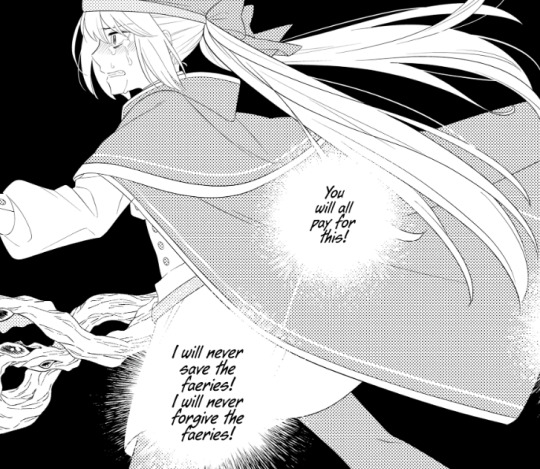
I give up, if everything has failed if it has all come to nothing, then I can never believe in people's so called goodness or understand it.
Even if I did, what would be the point? Everything I did, everything I worked for... was just a waste of time.
After all the times they betrayed me I should ahve known better... but I still clung foolishly to a sliver of hope.
ANd now, because I wasted my time caring about something so utterly absurd, I've failed yet again.
If my intent was to keep britain alive, then I was a fool to think being its savior was the way to accomplish it.
No more. I will find another way. A better way.
...That's it. I won't deliver the fairies to absolution; I won't deliver salvation.
Enough of this faerie of paradise, enough of being Avalon le Fae, I should have ruled this land from the start.
However, as I said it's only Morgan's repeated attempts to be the hero and save the fairies that drove her to this conclusion. However, I'd be amiss to say that Morgan didn't have flaws or selfish qualities from the start. Morgan le Fay is created from the Morgan le Fay we created with from proper legend. I'm not going to explain the lore, but basically she's an alternate universe version, who received memories from the Morgan le Fay of our universe. She knows the story of Morgan le Fay who tried to steal King Arthur's kingdom out from under him.
Alternate Universe Morgan le Fay still had the same chip on her shoulder, and entitlement that our Morgan did. She wanted the kingdom, and wanted Britain for herself. Her desire to play savior might have come from that very same entitlement that she deserves britain. Similiarly, she was most likely hurt so badly from the lack of praise because she also deserves praise for her actions. She has a bit of a superiority complex that places her above the fairies and makes her believe she has the right to rule.
However, as I said Morgan didn't start out as a tyrant she did earnestly try to save the faeries despite harboring those more negative qualities and selfish intentions. She may have had a more self-serving variety of selflessness but it's more the fragility of her that causes her fall. She didn't fall because she was rotten to begin with, she was just not strong enough to withstand years and years of ungratefulness from the faeries and betrayal. She has all the makings of a proper hero, she decides to defy destiny to save the people of faerie britain when she was supposed to be their destroyer. However, because she's in a tragedy she falls due to her insecurities and flaws overwhelming her rather than rising to the occasion.
Her manga chapter and the FGO Lostbelt game prose itself uses the light in the distance as a metaphor for this. Morgan continues going forward on the faint light of hope that things will work out for her and that even as a tyrant she can save Britain. However, it's that same light that damns her. In tragedies heroic qualities become flipped into flaws. Morgan's most heroic quality is her determination, the willpower to endeavor for thousands of years to try to save Faerie Britain, but that determination makes her unchanging, causes her to make the same mistakes over and over again, and just makes her continually suffer like Sisyphus pushing his boulder up the hill.

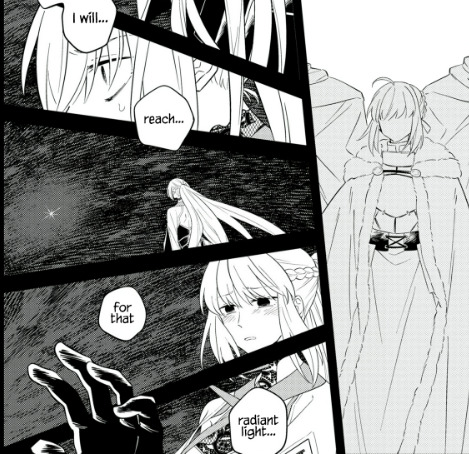

But that light is just an insect trap - or at least that's how it is for the protagonist of the tragedy. Road to hell, and all that.
After reaching her breaking point Morgan decides she'll no longer try to save the fairies but rather only care about saving the kingdom itself. She goes from the kingdom's hero to its oppressive tyrant after seizing the throne for herself.
That's where we meet the villain we know today.
Now shifting gears to Geto Suguru, he is someone who starts out his story trying to be a hero. A little bit of context on the world of Jujutsu Kaisen, it takes place in an urban fantasy version of Japan where the jungian collective unconscious and the negative emotions of humanity create curses that kill and eat people. These curses need to be exorcised by a few special humans who are given superpowers known as jujutsu sorcerers.
There is an institution of sorcerers known as Jujutsu High, which raises sorcerers from a young age gifted with these powers to exorcise sorcerers. THese teenagers are often sent out on msisions. This is different from most stories of teenage heroes with superpower, because fighting curses is brutal and dangerous and most of these kids are going to die young. There's also no end in sight to the fight against curses, because no matter how many curses are exorcised humans will just keep making more.
Not only do they live in a cynical, and brutal world but most sorcerers are insanely selfish. Just to give an example of how immoral sorcerers are, one of the allies of the main characters is implied to molest her brother, and if she's not she still uses her like 12 year old brother as a child soldier. Nobody ever bothers to question this because the institution of sorcerers are inherently corrupt, it's an instituion that continually sends children off to their deaths and uses people as nothing more than cogs.
Caught within this unfair system and trapped in a cycle of exorcising curses that are just going to come back anyway is Geto Suguru, who is not only a model sorcerer he's presented as much more selfless than your average sorcerer. He's directly contrasted against Gojo Satoru who is kind of just a petty kid with a god complex.

Gojo uses his powers selfishly, he only fights because he's really powerful and killing curses is a way to test and use his abilities. (This is literally stated as canon by Nanami don't fight me on this I'm simplifying his motivations because this is not a Gojo meta look at the entire fight with Sukuna saving Megumi was a secondary concern he wanted to fight a strong opponent). Whether people are saved by his actions are a secondary concern.
Geto on the other hand goes against the grain for most of Jujutsu Society, and believes that they as stronger people have a duty to use their strength to protect the weak. This idea of noblesse oblige is way way different from the attitudes of most sorcerers, who as I said usually turn into petty little people with god complexes.
Not to say Geto doesn't have a god complex, but we'll get to that later. Geto is explicitly contrasted against Gojo who's the only other powerful sorcerer and his best friend, but doesn't think they have an obligation to use their powers to help anyone.
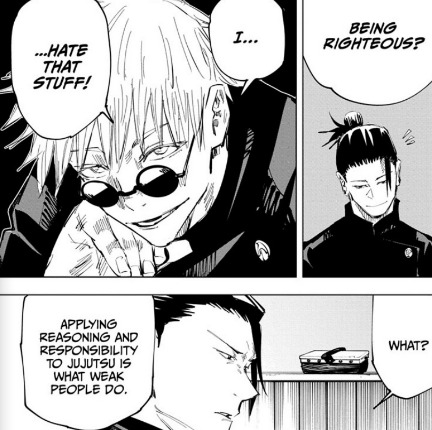
Right away we have two things in common with Morgan le Fay, number one they hold themselves to a higher minded ideal that of using their powers to act as a hero and protect the people underneath them. Number two, this is a choice they make to be better than the people around them. Morgan's destiny is to destroy the faeries and she tries to save them. Sorcerers usually just keep their heads down and do their jobs, they're not heroes, they don't save people they kill curses. In fact, the sorcerers who are selfish assholes (Mei Mei) are wildly succesful, the ones who try to help other people like Nanami die young.
They sacrifice themselves for others. Geto pursuing his higher minded ideal is faced with the same kind of tragedy that Morgan is, where his attempts to save a teenage girl named Riko not only blatantly fail, they fail because of Toji a person who cannot use cursed energy. Everyone they tried to protect died, and they're shown first hand not only does the world not really care about their idealism, but they're not really powerful enough to change this world in any way.

Morgan's lover Uther and all of her allies is ruthlessly slaughtered, by the same faeries she was trying to save after she brokered peace. Geto tries to save a little girl, and he not only watches her die, but he sees an entire crowd of normal people, the people he is fighting to save applause for her death. They all applaud her death because they're a part of a cult that believes that the girl was an affront to their god, but she was mostly just a normal teenager. He witnesses first hand that normal people do not care for the fate of Jujutsu Sorcerers whatsoever.
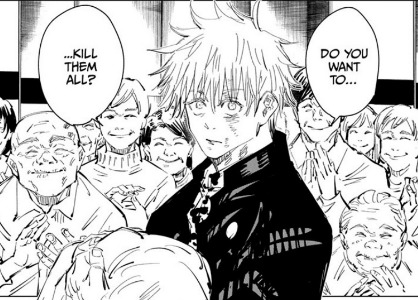
If Geto were more selfish he would be rewarded. If he didn't attempt to save people, if he just only cared about exorcising curses like Gojo did he'd probably become more powerful and he wouldn't succumb to despair the way he had. Geto exists in a narrative where selfishness is rewarded, and his selfless, heroic traits are continually punished.
This traumatic event makes him aware similarly to the brutal cycle he is caught up in. Morgan le Fay can't save the faeries, because faeries are jerks who can't change. Geto will just continually exorcise curses over and over again. Not only is humanity just going to keep producing more curses, but humans are vastly indifferent to the sacrifices that sorcerers (who are mostly children) keep making to try and save them.
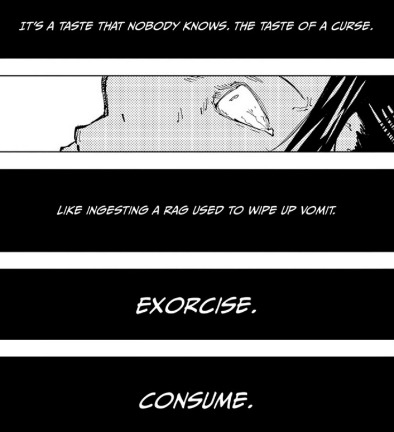
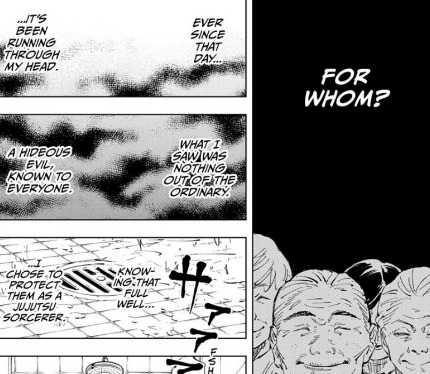
Geto's choice to protect people is the cause of his suffering, because sacrifice is inherently taking on suffering for the sake of someone else - therefore sacrifice is suffering.
This too, leads to Geto's eventual breaking point where he lets his resentment for the same people he's trying to save corrupt him. An incident where just after seeing his dear friend die because of a curse, he's brought to a village of people. The whole village put two little girls in a cage, who were capable of seeing curses and blamed them as the scapegoat for a curse reflecting his village. Geto sees a flash of what happened to Riko again, a crowd full of normal people who don't have to fight curses applauding for the sacrifice of a little girl who was innocent. It's the macrocosm, all of society forcing a few sorcerers to die exorcising curses for them, shown on the microcosm, one village scapegoating two little girls who did nothing wrong.
That's what leads Geto to snap and massacre the whole village. He's now turned against the masses he wants to protect. He then decides that instead of protecting the masses, he's going to kill them and build a world of only sorcerers. He's no longer trying to save them, like Morgan le Fay he's turned to the hero and the Tyrant.

They both even utter similiar words.
I will never save the faeries! I will never forgive the faeries!
I don't like monkeys. That's the truth I chose.
Monkeys is by the way, the word Geto uses to refer to normal people who cannot fight curses or even see them. People who don't have superpowers.
One more time I want to emphasize Geto did not come out of the womb wanting genocide. Hamlet didn't start out the play stabbing people. He does have his flaws, just like Morgan by assuming the role of the hero he sees himself in a separate, superior category to the people he wants to protect. There's a line I like in a youtube analysis for for Yuji that applies to Geto as well.
(Other people exist to be saved, which gives Yuji a role in the world)
In a way Yuji thinks other people exist to validate his own existence.
Geto begins the story not seeing other people as people. They exist in a category separate from himself. Part of the reason that his failures hit him so hard, is because they disprove this idea of superiority he has for himself. He's shown his god complex is just a complex and he's as flawed and capable of failure as any mortal.
It's an inability to recognize that failure, learn from it, and reconcile it with themselves that causes both Morgan le Fay and Geto to spiral. They are the hero, they are trying to be just, they should reap the just rewards for being a hero. Geto even says as such in a moment of rare jealousy for Gojo, that Gojo is someone who also has godlike power and if Geto had that same power he could change the world the way he wants. He could create his more just world.
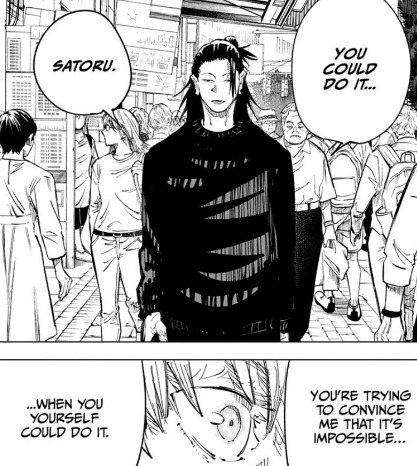
Morgan and Geto are characters who begin their narratives with superior complexes and senses of entitlement, selfishly selfess heroes and those negative qualities eventually lead them to fail. Geto thought being a sorcerer made him superior, he just also thought that with that superiority came a responsibility to protect others. Morgan le Fay thought she was the rightful king of Britain, she also thought that divine right to be king also came with an obligation to protect Britain. However, they're not meant to be seen as people who all along wanted to oppress and hurt others.
The key word with tragedy is catharsis, we are supposed to feel for the protagonists of tragedies. We're supposed to see our own traits reflected in them. It's their human qualities to drive them to tragedy.
After all, you reader on tumblr would probably not be able to be a perfectly selfless hero. If you saved someone and then they immediately tried to kill you, you would probably just be a little bitter about it. If you were like Geto and you were working tirelessly to exorcise curses, and all you got was your friends dying, I don't think you'd be like "This is okay :D". If anything, going mad in their extreme circumstances seems like a reasonable response, because could we as the audience do any better in their situations?
Of course the last similarity between Geto and Morgan (besides the fact they both adopt daughters they raise up to be little psychos but this post is getting too long already) is the fact that they both heavily foil the heroes of the story they occupy. They see themselves as villain, they play the role of villain, but they're really just heroes of another story.
Paradise or god or fate or whatever in Faerie britain eventually conjures up another chosen one. This chosen one Altria or as the fandom calls her Castoria is far less heroic. IN fact unlike Morgan who embraces the role of savior she would rather do anything she could to avoid Britain.
This is because for similiar reasons as Morgan, the faeries have basically abused her and tormented her all her life. Yet they still expect her to selflessly step up as their chosen one and save the day from the evil oppressive tyrant Morgan.
You have one protagonist who embraces their heroic quest, and even goes above and beyond by ignoring her destiny to wipe out the faeries and saving them instead. You have another who continually runs away from the heroic quest, and honestly doesn't seem to care that much about saving faeries.
Morgan is actually openly sympathetic to Castoria, and even offers to ally with her a couple of times because she bears the same burden as chosen one. This is another example of how Morgan doesn't quite fit the role of either hero or villain, the ambiguity who makes tragedy.
However, while Morgan does everything to defy fate, Castoria just kind of keeps marching along every step of Joseph Campbell's the heroes journey until she ends up defeating Morgan. Well she doesn't truly defeat her, but Morgan meets her tragic end and gets stabbed a whole bunch of times.
There's a similiar foiling between Geto, and the series protagonist Yuji who both start out the story believing that as sorcerers they have a duty to save others. There are several in story comparisons and direct parallels between the two.
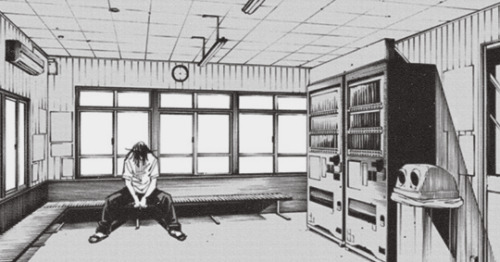

Yuji attempts to save others with his power as a sorcerer over and over again, and is met with the same continual failure that Geto has. Yuji is the only real sorcerer in his generation that cares about saving strangers with his powers. Nobara wants money to live in Tokyo, Megumi only cares about protecting Yuji and his sister, Yuta only cares about his friends, Maki only wants revenge against her clan. Like Maki blatantly says whether people get saved or not by her actions is none of her business.
His own attempts to save people not only fail badly, but he watches people die. He watches a lot of people die in a situation where he is powerless to stop them.
He's met with the same tragedy of Geto but he doesn't succumb to it. The same for Castoria she doesn't decide to be a Tyrant the way that Morgan le Fay did. I would argue this isn't because of any inherent goodness that Castoria or Yuji have but rather because both of them are able to let go of their egoes. Yuji kind of believes the same thing Geto does, that other people exist to be saved by him. He's broken when he realizes that he's not a savior after all...but he's able to continue in a way that Geto isn't.
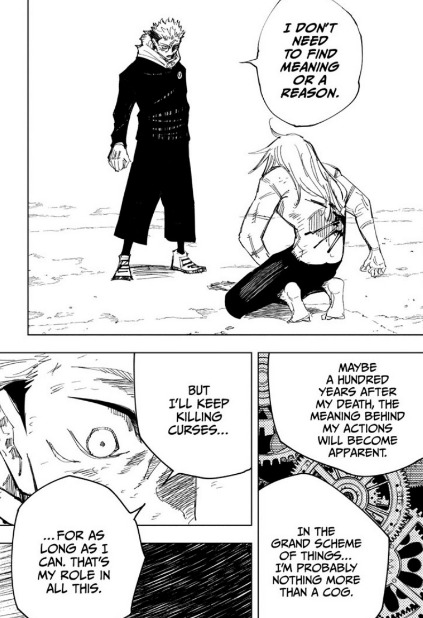
Yuji lets go of his ego entirely and believes that he's just a cog in the machine and he doesn't need to be some big hero or be rewarded at the end of his hero's journey.
Geto and Morgan le Fay both long for a role in the grand scheme of things. They are still employing narrative thinking, they need to play a story role to validate their existences. It's just that they flipped their role, they tried being the heroes but it didn't work so they're the villains now.
Geto is similiarly rebuffed by Yuta who is his eventual killer by saying that he doesn't actually care about saving the world or if Geto is right that sorcerers are superior to humans, he's only fighting for his friends.
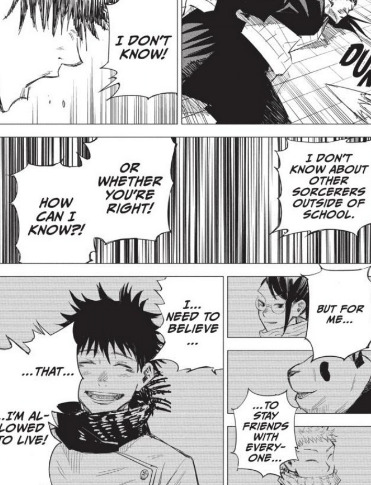
I would say for both castoria and yuji it's not a matter of being inherently good people, but rather of being better at enduring than their counterparts are. Morgan le Fay and Geto try to take the world's suffering on their shoulders, and it breaks them because they're not heroes they're just normal people. Yuji, Castoria and to the same extent Yuta kind of learn to let go of their great heroic aspirations but because of that they're able to take on suffering better. They're trying to live in reality not a grand heroic fantasy.


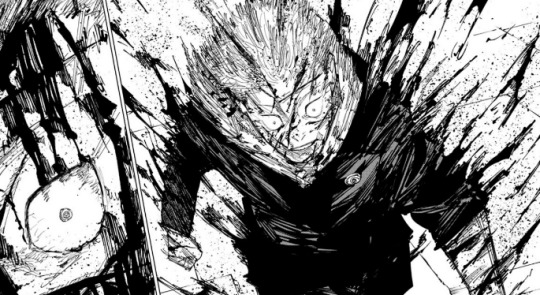
To bring the example back to FGO, for Castoria and for Morgan the light of hope that led them down their heroic journeys mean two different things. For Morgan that light is an insect trap. Her flying towards that light just causes her to keep suffering through her sisyphian task. Castoria has a much more realistic point of view, she's not trying to get a happy ending or even save people, that light is the hope that at the end of her journey her actions will have meant something. It's more about the journey itself and the people she met along the way, then some big grand reward at the end.
Morgan le Fay and Geto both fail because they are fragile, because they are human. That's the most important takeaway of this long rambling post. They may be selfish, they may be entitled but they're flawed in human ways. After all, who doesn't want a happy ending?
#jjk meta#fgo meta#morgan le fay#fgo morgan#camelot#fgo lostbelt#geto suguru#suguru geto#idk what else to tag this#for the three people who are going to read this post#i hope you like this comun#the things i do for love
124 notes
·
View notes
Text
Lately I've been thinking that Michael Cory Smith could do a live action version of Flug from Villanous and Lee Majdoub from Slug from Heroic.
#In the past I did a live action cast of Villanous/Heroic for fun#I still like who I put as the other characters#But I just came up with this and I really like it#villanous#Villanous cartoon network#heroic#heroic villanous#villanos#live action cast#dr flug#dr slug#cory michael smith#lee majdoub
3 notes
·
View notes
Text
Stolas Missed opportunity. He's a Helluva good villain.
Imagine a story where we have a someone who is respected royalty but doesn't hold the same degree of responsibility of others, a nepo baby who doesn't run a region and doesn't appear to run a business, free to chill in his palace and deal with his boredom and frustration by abusing his power and status, by calling on someone to entertain him, entertaining being of the sexually nature and the entertainer being of the uncomfortable corner commoner trying to better his life variety.

Once an innocent child who made a friend for a moment with a kid who was paid to hang out with him, he would form his first ever connection with another, however after decades of absence this one sided friendship would escalate to the transactional exchange mentioned, initiated by him when he was sad and mad and could do with a pick me up. He had no issue using someone he had a taste for but was ultimately disposable as a springboard to cause a scene and fallout.
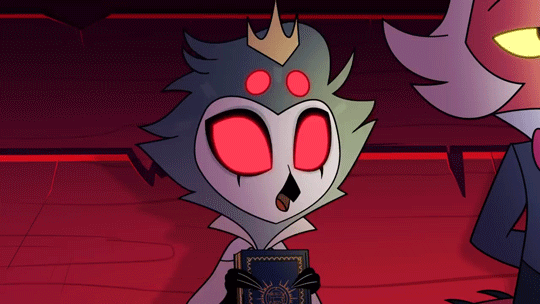
This same someone grew up in his palace void of any parents but with servants who, are as far as this society is concerned, a social class just a step up from animals who superiors are welcome to treated as objects.
The awkward fuckbuddy is of this class.
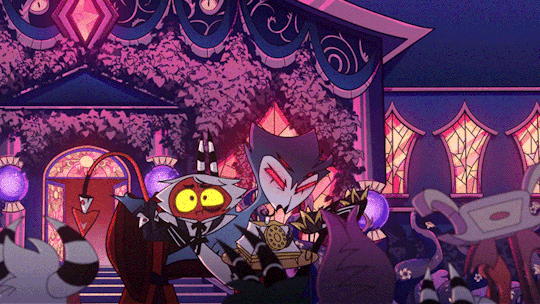
All this alone would be the making of a great powerful villain. All this is Stolas content.
Only there's much more to it and it only makes things worst.
His backstory that was clearly intended to make us sympathize with and like him more, only it all added to his villain origin story.
There is no sex positivity surrounding his character, he was betroved as a small child following rare quality time with a powerful, very out of touch parent who just got done buttering him up, he was forced into a marriage where there was mutual dislike and forced to have a child as a teenager. This chaos was bought into his home. He remained in this marriage where he is regularly berated because he wanted his child, the only person he's decent to aside from his superiors, to live a normal life..

What does he know about normal?
At this point his perception of every and any relationship could be off.
Stolas is a lot like two fictional villan characters the audience root for dispite their victims being totally innocent.
Stolas is pretty much Patrick Bateman (American Psycho) and The Beast (Disney's Beauty and the beast).
With Patrick, so many similarities, hanging out at the social mixers he has no place being at, decadence and superiority, existing to work, the meaningless sexual relationship, sex negative interactions with sex workers, zero relationships with family (excluding Octavia who Stolas was made to have), many acquaintances to tolerate, zero regard for those with nothing and little proof of self awareness and understanding decency because both are very privileged and powerful individuals living in a hell like place where they can do whatever they want with no consequences because those they hurt don't matter.

Only this Patrick has had a spark light in him when he finally saw a plaything as a person and someone heroic, this was after Blitzø helped find Octavia, not that he had any choice in that matter, not like he was ever at fault for her absence i the first place that occurred on Stolas's watch at home as he entertained himself bickering over the phone during a visit and the grimoire she stole is her dad's property which he fails to safeguard away from home.

Accountability is lacking with him and generally highlighted when it comes to Octavia, the previous occasion he failed to hear his daughter the first occasions we saw him think about his ways.
His love for his daughter is evident, yet these examples show how much she is needed in his journey to decency.
Still there's a common audience trigger right there, he's not a great dad.
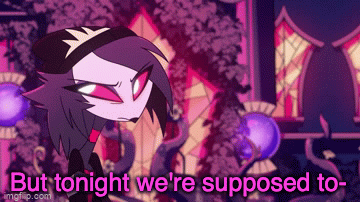
Stolas is comparable to The Beast as someone else who grew up in his own castle being raised by the workforce who would one day have an 'agreement' of sorts forced upon him. Years pass by and it takes that one person who he trapped but began to warm to for him to learn some decency, over time he wanted the best for this person even if that ment giving them freedom.

Though Disney's Beauty and the beast is child friendly, the beasts was pretty ferocious (totally lost in that bland live action) and Belle did have few options but to reluctantly be in his company. Belle, like Blitzø, is a strong willed and quick thinking individual (with an attraction to books), they may not seem the typical victims but this doesn't take away from their situation.
In other news.

Stolas has the most beastly looking transformation.
Mammon has been put forward as the leading powerful villain and as interesting as whatever his revenge could be, he's quite frankly adorable in comparison to Stolas. Ozzie, Mammon and Bee pretty much got bigger and a little more detailed whilst Stolas has the most intimidating looking transformation, one that appears to step outside of the artstyle.
His other form also got the most sinister introduction, he truly got to be creative and show us how twisted he was when he went to rescue I.M.P, the company run by his plaything who has his grimore, the transaction for sex.

He has been right there the whole time. It's unfortunate that the tone and a lot of the audience seem so opposed to a character intended to be a loved and charismatic figure also being controversial and certainly in the wrong. We have a sympathetic predator who appears to be learning and growing.
59 notes
·
View notes
Text
[Yall bad news, I'm slowly falling out of Hazbin and into Villanous/Heroic (Google it idfk-) SO
Yall want me to try to make a blog for those ocs?? I've been putting it off for a bit but it's taking me over istg
I might get back into Hazbin again when Season 2 rolls around, but until then I'll be in the Villanous hashtag lol]
21 notes
·
View notes
Note
I know I've been in your asks before but I need a lecture on the ship "Saintspierre". I don't know the historical context behind it and why they get villanized so much. I'm a newbie when it comes to history. Thank you! :)
Hello again! So Saintspierre is the ship between Robespierre & Saint-Just of the French Revolution, who are often depicted as queer-coded villains in adaptations of the Revolution to serve as a counterpart to the Straight and Manly ™️ Danton. This happens because reactionaries are eager to push the narrative of 1789 being "the Good Revolution" and 1792 as "the Bad Revolution." Danton represents the Good Revolutionary, who advocates for change but is against offending too many moderates, while Robespierre is the Bad Revolutionary who brought on the Reign of Terror. They make Danton out to be a tragic victim who heroically tried to stop the Terror (even though he had a major hand in starting it and was corrupt af) and Robespierre out to be a gay psychopath who killed him out of jealousy. You can see this in La Revolution Francais (1989), Danton (1983), the BBC documentary, and many other adaptations.
For example, LRF goes out of its way to depict Danton as a loving family man, with a frankly excessive number of scenes of him making out with his two wives, while ignoring how he was a creep who sexually harassed women and that his second wife was 16. His close ally Camille is also depicted as very loving with his wife Lucile. Meanwhile, Robespierre is never shown being affectionate toward any women. The only person he has multiple close interactions with, besides his childhood friend Camille, is Saint-Just, who struts into his attention in part 2 and ruthlessly replaces Camille at Robespierre's side. Literally, Saint-Just's only character traits in this movie are being pretty and zealously urging Robespierre to kill Camille specifically. They even made up a scene where Saint-Just sends thugs to beat Camille up while making Camille think it was Robespierre who did it, so he can cause an irrevocable break between them. They give him no backstory, no explanation for his motivations, and completely erase his military accomplishments. He's just an homme fatale who lures Robespierre to the dark side with his pretty hair. This is a common tactic in works that struggle to reconcile the fact that Robespierre was on record being a pacifist who opposed the death penalty, opposed the war, and fought for the rights of the poor, with the propaganda that he was a monster responsible for the Terror. They blame his fall on Saint-Just.
Another tactic they use to villainize Robespierre is exaggerating his vanity. There is ALWAYS a scene where Robespierre gets his wig pampered. I mean, yeah, he DID care a lot about his appearance and never stepped out of the house looking like shit...but Danton wore a wig too. 99% of Danton's historical portraits have him in a wig, yet these works have him conveniently ditching it in most scenes to rock his Messy & Manly Natural Hair, and you will NEVER catch them showing Danton caring for his wig. No, only fops like Robespierre do that...even though it was just the norm at the time for lawyers to wear wigs. They put shady emphasis on Robespierre following 18th century fashion norms that have now become feminized, like wigs, lace cuffs, and stockings, to further queer-code him.
THOUGH, it's true that even historically, Robespierre was seen as a strange man in many ways. There are many contemporary accounts that rail on him for repeating things, being socially awkward, being blunt and callous, hating physical contact, having no emotions, being incapable of love--when from a modern lens, it's clear to me that he was just autistic. Like omg, leave the man alone. But when people want to villainize someone, they latch onto the traits that make them seem odd, that stray from typical societal expectations. When it comes to Robespierre, his villainization thus becomes very gendered, homophobic, and ableist, because he was 36 and unmarried and didn't abuse his power to sexually harass women and cared about his appearance and had a large female following and was most likely autistic. Meanwhile, Saint-Just gets exaggerated as a breathtakingly handsome twink who wore an earring and has a fancy bathroom that Camille roasted him for. Like omg, how dare a man have running water in his bathroom and not look like shit in the 18th century!!
Personally, I ship Robespierre & Saint-Just as a form of rebellion against this villainization. If they were gay, so WHAT? It would be cute. Fuck the homophobes. They did have a very touching relationship with each other. They shared many similar ideas and complemented each other's personalities and Saint-Just chose to defend Robespierre to the end even though he could've easily saved himself on the basis of his military merits by staying out of the drama. The fact that he was prevented from finishing his last speech, in which he defended Robespierre, is one of the saddest things in the whole goddamn Revolution.
Is there historical basis for their relationship being explicitly romantic? Most of their correspondences have been burnt, so we don't have much, but I ship it regardless in a historical fiction, What If? kind of way. Robespierre and Eleonore aren't romantically confirmed either, but nobody bats an eye when mainstream media or even historians treat them as "canon." I think that is very heteronormative, so I am ride or die for Saintspierre as protest. Some historians have pointed out that we have no records of any warm interactions between them, but I think they understood each other in a way that didn't require pleasantries, and that's what makes them so compelling to me. There's Charlotte Robespierre's infamous casual revelation that Saint-Just was Maximilien's 2nd favorite revolutionary, just after his own brother and OVER Camille. Then the Duplay testimony that Saint-Just would go up to Robespierre's room without saying hi to anyone else. It's these little things!!
Anyway, I'm leaving out a lot of details about precisely what Robespierre & Saint-Just were and weren't responsible for in history, but just know that they were two of the only clean, honest political leaders of the time. Never took a bribe, never embezzled, meant everything they said, were genuinely committed to the ideals they spouted. It's incredibly unfair that they, along with the other leftist paragon Marat, ended up with the worst reputations.
219 notes
·
View notes
Text
IN DEFENSE OF THE ALIEN DESIGNS IN STRANGE WORLD
@themousefromfantasyland @the-blue-fairie @tamisdava2 @minimumheadroom @thealmightyemprex @amalthea9 @angelixgutz @grimoireoffolkloreandfairytales @softlytowardthesun @grimoireoffolkloreandfairytales

So, I read on-line some comentaries saying that it was hard to connect to the titular Strange World because of how out of this world the alien creatures were.
Their designs were considered too strange, to the point of being considered scary by audiences, who expected those creatures to be intimidating monsters, rather than the neutral, if simpathetic beings they were portrayed as.
This characterization apparently didn't correspond to what is expected from their appearance.
And I started to investigate in my memory: why this disconect happened?
Why it was more easy to imagine those beings as villanous monsters, rather than the simple living beings they actually were portrayed as?
So, when it comes to other worldly creatures written in fantasy and science fiction works, since we are humans, it has historically been more easy to connect to alien fictional creatures that are closer to humans, or at least other mammals.
The more distant they looked from humans in appearance, usually closer to reptiles or insects, the more likely they were to be presented as villanous monsters that must be eliminated by the heroes.
In fantasy you have the usual conflicts between heroic and appealing humans, elves, dwarves and halflings against the villanous and grotesque orcs, goblins and trolls.
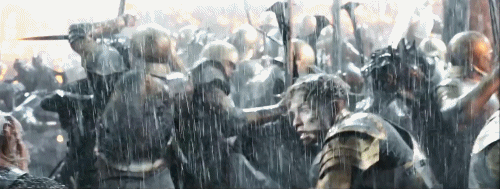
And in sci fi, the more sympathetic aliens are the ones that look close to humans, while the more far from humans that alien is, the more likely is that they will be the treat to be fought.
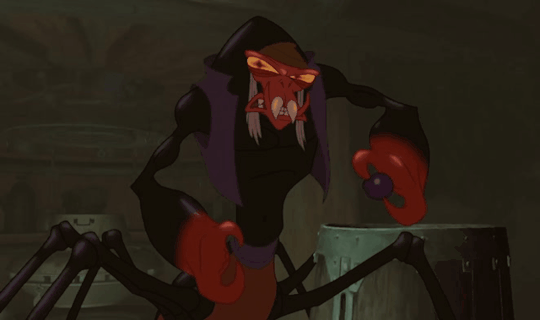
In the Lindsay Ellis video "Designing the Other", she brings up the important point on the emphasis on eyes to make audiences form a connection with an alien character.
When they have big, expressive humanoid eyes, they are more likely to win the audience's simpathy:
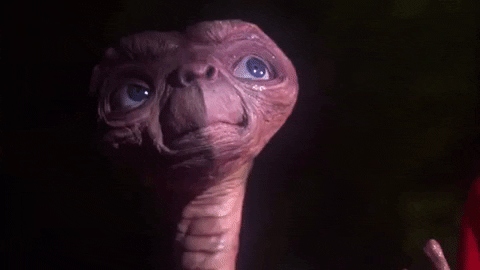
When their eyes are more insect like, or non existent, then they become mysterious, threatening monsters:

Jack Saint's video "Avatar: Dances with White Saviours" comments that the presentation of the planet Pandora and the native Na'Vi as conventionally beautifull is used as the main argument to make audiences simpathize with it and support its message of echological preservation
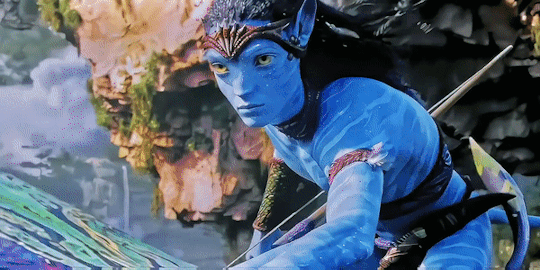
While less mainstream literary sci fi would present the message that even the non beautiful, even violent ecossystems and creatures are important for the balance of the enviroment and have the right to be preserved.
And then there is Strange World
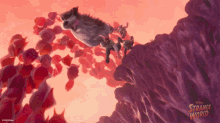
Strange World presents a story where a team goes trough the subterranean to save the plant that is their source of eletricity from creatures that they perceive as an agricultural plague.
The creatures follow the design pattern that we usually associate with monstrous, villanous aliens: far away from humans or other mammals, closer to insects, sea creatures and abstract cells.
We look at their appearance, and feel fear, treating them like abominations who would destroy us.
And the narrative knows that. Is an important discussion in the narrative.
When Jaegger joins the journey with the team, Ethan tries to show him and Searcher the card game Primordial Base, which is about finding peacefull solutions to live in harmony with the enviroment surrounding you, which includes the creatures you consider threatening eldritch abominations.
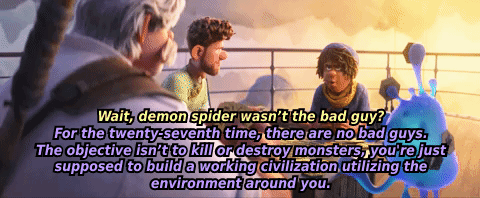
At first, Jaegger and Searcher fail to understand what Ethan says.
Then, they learn what his words means when they see that the supposed plague that they come to destroy was actually an imune system working to heal the living heart of their world, from Pando, the plant that for years they tought was beneficial.
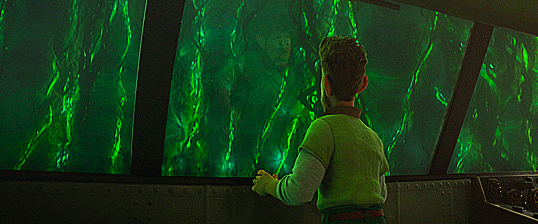
The saviours of their lives are the beings that they believed to be monsters.
Just because something is not what we perceive as beautiful, doesn't mean its evil.
That is the message that the characters had to learn to be alive.
And by extension, us, as the audience, had to examine our decades of biases on who is good, and who is bad, in the proccess.
Nature is neither good, nor bad. It doesn’t care about us.
It just is. That is enough reason that it needs to be respected and preserved.

38 notes
·
View notes